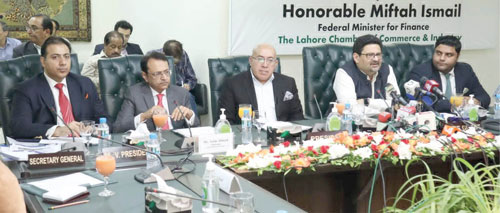Federal Minister for Finance and Revenue Miftah Ismail said on Saturday that if Pakistan boosts its rate of tax-to-GDP and exports-to-GDP up to 15 per cent, the government would not need to ask for aid from the world.
Talking to business community here at Lahore Chamber of Commerce and Industry (LCCI), he said that at present, there was 9.5 per cent tax-to-GDP ratio. Pakistan’s exports were US $31 billion while imports were US $80 billion. No country could afford such a large trade deficit so we have to control unnecessary imports, he added.
Miftah Ismail said that government was ensuring provision of 100 per cent facilitation to export-oriented industry with an effort to enhance the country’s overall exports.
Federal Board of Revenue (FBR) Chairman Asim Ahmad, LCCI President Mian Nauman Kabir, Senior Vice President Mian Rehman Aziz Chan and Vice President Haris Ateeq, former office-bearers and executive committee members were also present, while State Bank of Pakistan (SBP) Governor Jameel Ahmad attended meeting through Zoom.
Finance Minister said that when the government came into power in April 2022, there was a serious threat of default as the foreign exchange reserves were US $10.5billion while US $36billions were required for debt repayments and other expenses so tough decision, based on ground realities, were needed to avert the default. He said that no international financial institution was lending those countries that did not have three months’ foreign exchange reserves.
About the withdrawal of subsidies on petroleum products and power, he said, it was condition of IMF and was needed in order to bring Pakistan’s economy on the right track. He declared that the risk of Pakistan’s default had evaporated due to tough decisions such as an increase in energy prices and curtailment of imports, which slashed the demand for foreign exchange. He said that at present, Rs7.5 per litre and Rs37.5 per litre taxes were imposed on diesel and petrol respectively.
Miftah said that unfortunately the industry could not grow at a pace, which was required added that the production of electricity doubled from 13,000MW to 25,000MW in 2013-2018, but industrial production did not grow enough to consume this energy and increase the exports of the country.—APP










